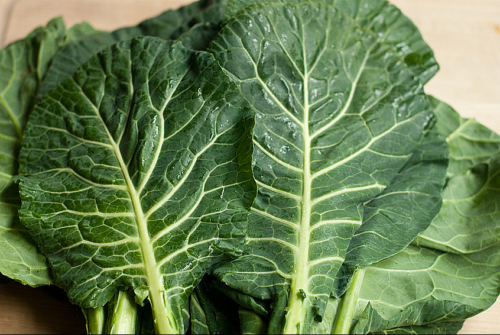Collards! We can’t live without ’em! They play a huge role in our community especially during the holidays and at gatherings. When it comes to nutrition, they’re chock-full of good stuff like vitamins A, B-6, C and K, and minerals like calcium, iron, and magnesium.
The super-low-in-calories, cruciferous vegetable family member is also rich in phytochemicals (plant chemicals) which are believed to protect cells from damage that could progress to cancer. Collards are said to offer protection against such chronic illnesses as diabetes, heart disease and Alzheimer’s. A healthy complexion, increased energy, lower weight and overall mortality can also be attributed to these yummy greens.
Wait a minute! Collards also contain a water-soluble, vitamin-like, essential nutrient called choline, mostly found in many plants and animal organs. Scientists who have researched choline discovered that it helps with muscle movement, learning, memory, and sleep. Choline contains folate that can aid in depression.
Another health benefit to shout out about collards is their ability to actually lower cholesterol more than any other member of the cruciferous tribe, which beats out kale, mustard greens, broccoli, and even Brussel sprouts. Collards can also aid the digestive tract by binding bile acids, making it easier for them to exit the body.
Now, we typically cook our collards by adding some spices and throwing in either pork, beef, or smoked turkey. According to food scientists, just adding 1½ cups of collards to your diet at least three times a week gives your body a real healthy injection of pure goodness.
Some southerners even drink a collards concoction they refer to as potlikker, which is just the veggie, slow-cooked down to a broth. Slaves used to cook collards, drain them, then feed the potlikker to their families.
Now that we’ve got your mouth watering, just thinking about collards, run out and get a bunch or two. Choose collards with leaves that are firm and smooth. Fresh leaves can be stored for up to three days in the fridge and up to ten days in the freezer. If you’ve had collards cooked, try eating them raw in a salad. If you prefer to cook them, use a small amount of water because they are healthier when steamed so as not to remove the nutrients. When collards are overcooked, you’re left with a food that no longer packs a nutritional punch.
Since juicing is all the rage, try tossing in two collard leaves into your juicer along with a carrot, two small green apples, ¼ lemon (sans the peel), 1-inch piece of peeled ginger, and viola; you’ll not only have a healthy but yummy drink as well, so bottoms up!
